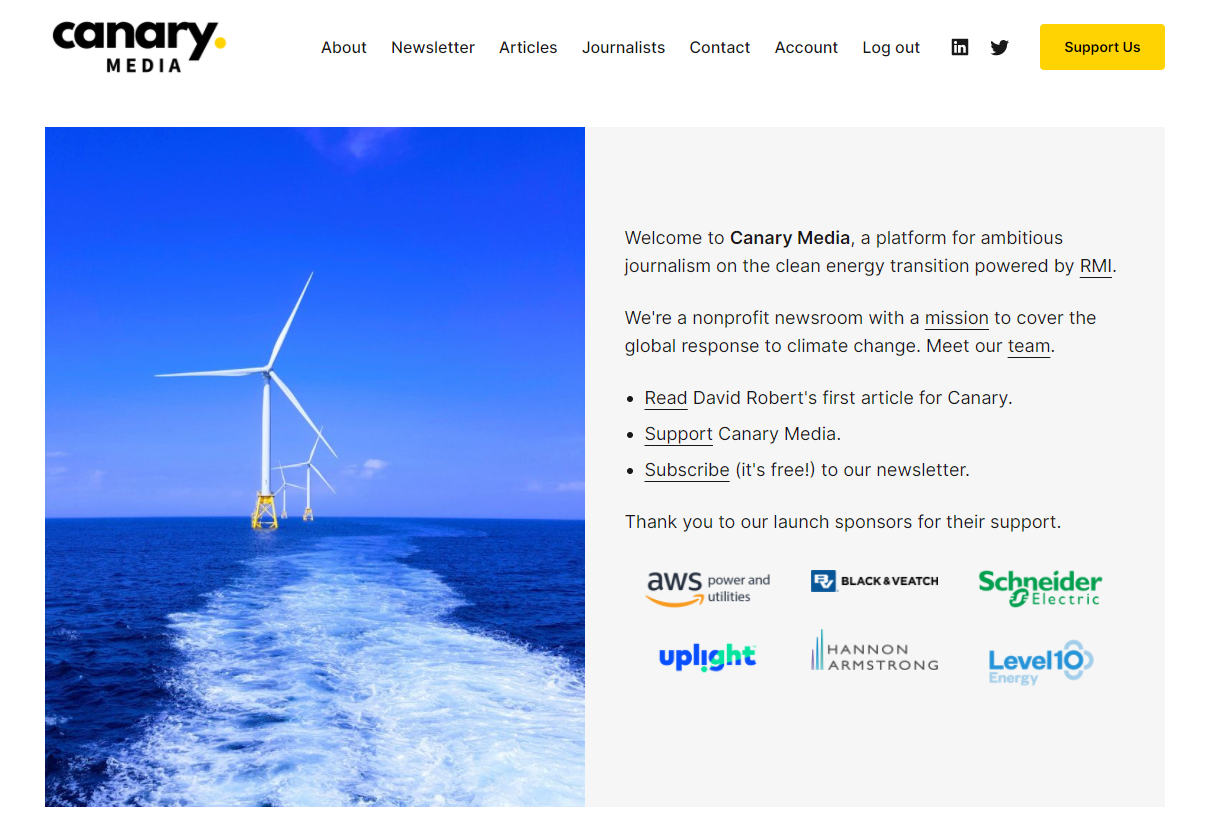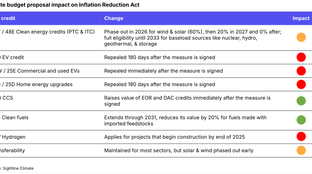
🌎 Overheard at LCAW #252
Climate, capital, and carrots in London's new playbook
Plus, CTVC turns 1 years old!
Happy Monday!
In an exciting turn, the journalists of Greentech Media have brought a new wave of climate tech reporting back to life as Canary Media. In this week’s feature, we scoop the reporters’ and RMI’s take on the latest climate tech outlet’s news and moves, how v2.0 compares, and hopes for the new Rocky Mountain Institute partnership.
We’ve also got a bevy of news, jobs, and a quick CTVC update - features will be rolling out mid-week. We’re excited to continue to invest in giving you even more robust coverage going into our second year.
Thanks for reading!
Not a subscriber yet?
After one year of writing Climate Tech VC, we’re honored to have grown to so many active readers committed to climate tech. It’s been a journey in discovering our voice, figuring out what’s new and newsworthy, and ultimately in making sense of all the excitement and impact across climate today. Thank you! Your engagement, questions, and continued support have kept us going and built even more momentum.
As we mature our newsletter and have more content to share, we’ll be experimenting with a few different formats for features (monthly deal digests, Q&As with multiple founders, etc.) and releasing these separately on Thursdays, starting next week. We’ll continue to remain in your inbox every Monday with your regular dose of deals, news, events/ opportunities, and quick takes to kick off the week’s climate conversation.
☢️ NuScale Power, a Portland, OR-based developer of small modular reactors for nuclear power, raised $40m from JGC Holdings.
☀️ Syzygy Plasmonics, a Houston, TX-based maker of a photocatalytic reactor for industrial applications, raised $23m in Series B funding from Horizons Ventures, Equinor Ventures, The Engine, GOOSE Capital, and Evok Innovations.
💨 Andium, a New York, NY-based “industrial internet of things (IIOT)” startup providing remote-field monitoring to reduce emissions among the oil and gas sector, raised $15m in Series A funding from OGCI Climate Investment, Tom Miglis, and Talis Capital.
⚡ LineVision, a Somerville, MA-based provider of non-contact overhead power line sensors, raised $12.5m in Series B funding from UP Partners, National Grid Partners, and Zoma Capital.
🌱 Guardian Agriculture, a Boston, MA-based crop protection company, raised $10.5m in Seed funding from Leaps by Bayer, FMC Ventures, Cavallo Ventures, Fall Line Capital, E14 Fund, Pillar VC, and Neoteny.
⚡ Project Canary, a Denver, CO-based provider of emissions monitoring and ESG data for the energy, manufacturing and waste management sectors, raised $10m in Series A funding from Quantum Energy Partners, Global Reserve Group and Energy Impact Partners.
🌱 dClimate, a New York, NY-based decentralized network for climate data, raised $3.5 in Seed funding from CoinFund, Multicoin Capital and Republic Labs.
🔋 Nth Cycle, a Knoxville, TN-based recycling tech startup extracting metals from waste to make new batteries, raised $3.2m in Seed funding from Clean Energy Ventures.
🔋 Volexion, a Chicago, IL-based developer of a graphene coating for lithium-ion batteries, raised $1.1m in Seed funding from Clean Energy Ventures and Energy Foundry.
✈️ LanzaJet, a Chicago, IL-based producer of sustainable aviation fuel, raised an undisclosed amount in funding from Shell.
VoLo Earth Ventures, a Colorado-based firm focused on climate tech, is raising $100m, per an SEC filing.
RootAI, a Boston, MA-based robotics-ag startup has been acquired by indoor farming company Appharvest for $60m.

Greentech Media (GTM) first broke news on the clean tech media scene in 2007 – bolstered with venture capital funding from Lightspeed Venture Partners and Northport Investments. GTM’s three-pronged model of (1) journalism, (2) events, and (3) research differentiated their editorial voice during the early innings of the energy transition, when renewables like wind and solar started quickly scaling down the cost curve. Eight years later, Wood Mackenzie (WM) acquired the venture-backed media company, purportedly to diversify the oil & gas research firm’s energy coverage to include renewables. This year, with the energy transition finally accelerating into hyperspeed, WM announced GTM’s shutdown – generating an outcry from #EnergyTwitter and other longtime readers.
With high demand for heavily-researched greentech and energy coverage, the 8 person untethered news team surveyed various paths to continue funding their operations. As we write this newsletter from Substack - the evolution of the media landscape now spans independent offerings monetizing through centralized digital platforms to integrations with existing media motherships. Amidst the backdrop of The Great Unbundling of media, the former-GTM desk entertained monetization opportunities via subscriptions, sponsorship, donor-funded, and venture-funded, before promptly finding a new home: Canary Media, an independent climate media platform housed by non-profit, Rocky Mountain Institute (RMI). It’s worth calling out the decision to align with a 501c3 nonprofit with endowed resources and a shared mission, particularly in the wake of GTM’s venture-funded odyssey.
We got the scoop with Eric Wesoff, GTM’s first employee and Canary Media’s new managing editor, and RMI’s CEO Jules Kortenhorst about the business model, strategy, and mission behind the sentinel species of new climate media.
How will Canary Media look different from GTM? What’s ‘greentech media’ vs. ‘climate media’?
We didn’t want to create GTM 2.0; we wanted to be better. The greentech world of 2010 is not the same as what’s happening today – in terms of political, consumer, and corporate sentiment, and the sheer scale of renewables deployment. Coverage and personnel will need to be different. They’ll be more diverse and inclusive than over the last 10 years.
We were lucky to partner with RMI, which has an enormous set of research that we can leverage for our reporting. GTM’s coverage leaned towards renewables but RMI’s research spans the entirety of decarbonization, transportation modernization, and the energy transition. We can’t cover that full aperture with four reporters - so we’re actively hiring and growing the newsroom in order to broaden our scope. GTM had a trade magazine feel, but with Canary we want to reach mainstream audiences, which is why we brought on David Roberts (“Dr. Volts”) who’s been able to reach hundreds of thousands of readers without getting stuck in the energy transition echo chamber. Our goal is to reach beyond this being an insider industry to tell everyone the epic story of climate change.
How does Canary think about building coverage of equity and inclusion within the energy transition?
In full frankness, our editorial and marketing teams are overwhelmingly Caucasian - and it’s a problem. D&I is front of mind and we’ve included diversity in our mission statement but we still have to walk the walk. We’re setting up an equitable energy transition beat with a dedicated journalist reporting on whether the energy transition is both fast and fair.
We’re actively hiring persons of color to fill that role. But finding great energy reporters is hard, and finding great energy reporters of color is even more difficult. Instead of just availing ourselves to the existing pool of talent, we’re also going to try to foster and cultivate our own pipeline of diverse reporters through a Canary incubator and training ground. If we want to diversify the newsroom, we’ll need to manifest that next generation of talent ourselves.
Why is a 501c3 the right model for Canary? How will the business be funded?
We’re a growing newsroom and need to pay our reporters to fund the storytelling. Greentech Media was an attractive acquisition target in part because it generated revenue, whether through sponsorship of articles, podcasts, or webinars, or providing marketing services. At Canary we’re going to keep that “bad habit of making money” going but now under the bounds of a 501c3 nonprofit which just means that these profits will be reinvested into the mission of the company.
Why is there a need for independent climate journalism and how does your partnership with RMI enable that?
From the first conversations we had with RMI, we insisted on being an independent news organization, which RMI’s CEO, Jules, endorses. Canary’s mission is to breakeven and pay our reporters. It’s funny that when GTM was part of Wood Mackenzie we never got these questions, despite being part of an O&G research company. At Canary we’re being held to a different standard, and we want to adhere to that. We’re going to keep reporting on the truth - that instinct is ingrained in the integrity of our employees and the mission we share.
What’s your view on the unbundling of media? How do you see Canary Media fitting into this new climate journalism landscape?
There’s so many moving parts happening in real-time. We’re watching Huffpost journalists get fired, media companies trying to SPAC, a whole group (including us) trying to do nonprofit journalism, and environmental journalism that sits behind a paywall. I don’t think that every journalist will be able to make money through Substack. We’re focused on our hybrid revenue-generating 501c3 model, and trying to execute on covering this larger segment in today’s very volatile news environment.
What was RMI’s motivation in launching Canary Media?
During this decisive decade for the climate crisis, we need credible, independent climate journalism more than ever. Without accessible, compelling coverage that reaches a large global audience, we will not recognize the scale and urgency of the challenge in time. We are truly in the race of our lives, and winning slowly is the same as losing. The GTM team includes experienced, informed journalists and an expert marketing organization - they’re positioned to effectively deliver detailed stories to important stakeholders in the clean energy transition.
How has big media / publishing covered reporting on climate to date? Why is there a need for independent climate journalism?
Although there are excellent journalists already focusing on the climate crisis, the scale of the challenge requires much broader coverage. Many areas of climate deserve deeper investigation, all around the world. Distressingly, during 2020, corporate television coverage of climate change in the US decreased by over 50%. In addition to reporters focused specifically on climate and clean energy, we need mainstream media to recognize how climate impacts almost every area of society.
Why is RMI best positioned to enable Canary Media as an independent climate journalism platform?
As a global nonprofit that has focused on climate and the clean energy transition for nearly 40 years, RMI brings deep expertise to support Canary Media as an independent climate journalism platform. Our mission is transforming the global energy system to secure a clean, prosperous, zero-carbon future for all. We span important sectors of the economy including electricity, buildings, mobility and industry, along with market catalysts to accelerate decarbonization in these sectors such as technology, finance and policy. Our systemic approach to transforming the global energy system will bring Canary Media an even more comprehensive understanding of the challenge we face.
Breakthrough Energy and CDP are launching the Catalyzed Emissions Reduction Framework to spur large-scale investments in climate solutions by quantifying carbon return on investment.
The Nature Conservancy, which has sold millions of dollars of carbon offsets to corporates like JPMorgan, Blackrock, and Disney, is investigating its own offsets after criticism that the nonprofit sold credits for forests in no danger of destruction.
Following his trip to Europe, Climate Czar Kerry is making his way through Asia and the Middle East to push for more ambitious climate action and sell Biden’s climate plan - even before Congress has decided its fate.
French lawmakers approvedabolishing short-duration domestic flights as part of their strategy to reduce carbon. Though a step towards reaching France’s near-term carbon reduction targets, the ban shrinks market opportunities for the electric and hydrogen aviation industry, currently only viable for short-haul flights.
Investors poured ~$1.25 billion into BlackRock US Carbon Transition Readiness ETF (LCTU) on Thursday, making it the biggest launch in the ETF industry’s three-decade history. Chris Sacca summed up our feelings about the “carbon transition” portcos…
SSAB, a steel maker, announced their partnership with Volvo to produce the first fossil-free steel for their cars. The Swedish carmakers are aiming for small-scale production with the hydrogen-formed steel starting 2022.
New York State is launching a two-part $19.5m Carbontech Development Initiative, $10m of which will kickstart the carbon capture and carbon-to-value institute and $9.5m will fund a fellowship program for entrepreneurial scientists in the field starting later this year.
BNEF announced the winners of its annual Pioneers competition, featuring a dozen early-stage companies making a dent in decarbonization.
In more post-GTM era media action, the former GTM podcast, Watt It Takes, goes independent!
Check out Grist’s list for the top 50 climate leaders of 2021, including Matanya Horowitz (AMP Robotics, issue #38).
Our friends at Elemental Excelerator released their 5 Year Plan to scale climate and equity solutions across energy, agriculture, water, mobility, and the circular economy. Equity in, equity out, equity throughout!
Are you in camp marimekko or 100% stacked bars? Some sweet charts in box form: breakdown of Biden’s Infrastructure Plan spend and the American Jobs Plan today. And bars form: voter support of the American Jobs Plan.
Another reason to go solar? Free beer! (While Down Under, at least...)
Learn about the history of the environmental justice movement – from how a 1982 protest in NC ignited the movement to how pollution today still disproportionately threatens people of color.
💡 Elemental Excelerator Cohort 10: Final call for passionate, diverse teams committed to solving climate change to apply by April 16th for Elemental Excelerator’s 10th cohort.
💡 Cleantech Open: Early-stage clean energy and environmental sustainability startups interested in accelerating their venture should apply by April 18th to the world's oldest and largest cleantech accelerator and business competition.
💡 Urban Future Prize Competition: Climate tech startups and climate justice organizations can apply by May 3rd to win $150,000 across 3 prizes.
Founding Executive Director @Carbon Removal Advocacy Europe
Research Associate @Sylvatex
Associate @iSelect Fund
Director of Investment Relations @LA Cleantech Incubator
Global Operations Lead @Running Tide
Marketing Manager @Leap
Product Manager @CarbonChain
Product Manager @ Heila Technologies
Senior Software Engineer @Allumia
Software Developer @ Heila Technologies
R&D Scientist @Kuleana
Feel free to send us new ideas, recent fundings, or general curiosities. Have a great week ahead!

Climate, capital, and carrots in London's new playbook

US plays popcorn politics with biofuels and beyond

Groundbreaking results from the geothermal developer’s main project